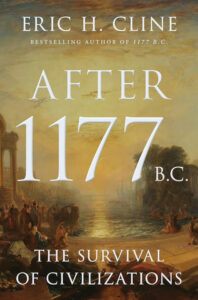CLINE, E. H. After 1177 B.C.: The Survival of Civilizations. Princeton: Princeton University Press, 2024, 360 p. – ISBN 9780691192130.
No final da aclamada história de 1177 a.C.: o ano em que a civilização entrou em colapso, muitas das civilizações da Idade Recente do Bronze do Egeu e do Mediterrâneo Oriental estavam em ruínas, desfeitas por invasões, revoltas, desastres naturais, fome e o fim do comércio internacional. Um mundo interligado que ostentava grandes impérios e sociedades, paz relativa, comércio robusto e arquitetura monumental foi perdido e a chamada Primeira Idade das Trevas começou. Agora, em Depois de 1177 a.C., Eric Cline conta a história do que aconteceu a seguir, ao longo de quatro séculos, em todo o mundo Egeu e Mediterrâneo Oriental. É uma história de resiliência, transformação e sucesso, bem como de fracassos, numa era de caos e reconfiguração.
Oriental estavam em ruínas, desfeitas por invasões, revoltas, desastres naturais, fome e o fim do comércio internacional. Um mundo interligado que ostentava grandes impérios e sociedades, paz relativa, comércio robusto e arquitetura monumental foi perdido e a chamada Primeira Idade das Trevas começou. Agora, em Depois de 1177 a.C., Eric Cline conta a história do que aconteceu a seguir, ao longo de quatro séculos, em todo o mundo Egeu e Mediterrâneo Oriental. É uma história de resiliência, transformação e sucesso, bem como de fracassos, numa era de caos e reconfiguração.
Depois de 1177 a.C. conta como o colapso das poderosas civilizações da Idade do Bronze criou novas circunstâncias às quais as pessoas e as sociedades tiveram que se adaptar. Aqueles que não conseguiram ajustar-se desapareceram do cenário mundial, enquanto outros se transformaram, resultando numa nova ordem mundial que incluía fenícios, filisteus, israelitas, neo-hititas, neo-assírios e neobabilônicos. Levando a história até o ressurgimento da Grécia, marcado pelos primeiros Jogos Olímpicos em 776 a.C., o livro também descreve como inovações que mudaram o mundo, como o uso do ferro e do alfabeto, surgiram em meio ao caos.
Repleto de lições para o mundo de hoje sobre por que algumas sociedades sobrevivem a choques massivos e outras não, Depois de 1177 a.C. revela por que este período, longe de ser a Primeira Idade das Trevas, foi uma nova era com novas invenções e novas oportunidades.
At the end of the acclaimed history 1177 B.C., many of the Late Bronze Age civilizations of the Aegean and Eastern Mediterranean lay in ruins, undone by invasion, revolt, natural disasters, famine, and the demise of international trade. An interconnected world that had boasted major empires and societies, relative peace, robust commerce, and monumental architecture was lost and the so-called First Dark Age had begun. Now, in After 1177 B.C., Eric Cline tells the compelling story of what happened next, over four centuries, across the Aegean and Eastern Mediterranean world. It is a story of resilience, transformation, and success, as well as failures, in an age of chaos and reconfiguration.
After 1177 B.C. tells how the collapse of powerful Late Bronze Age civilizations created new circumstances to which people and societies had to adapt. Those that failed to adjust disappeared from the world stage, while others transformed themselves, resulting in a new world order that included Phoenicians, Philistines, Israelites, Neo-Hittites, Neo-Assyrians, and Neo-Babylonians. Taking the story up to the resurgence of Greece marked by the first Olympic Games in 776 B.C., the book also describes how world-changing innovations such as the use of iron and the alphabet emerged amid the chaos.
Filled with lessons for today’s world about why some societies survive massive shocks while others do not, After 1177 B.C. reveals why this period, far from being the First Dark Age, was a new age with new inventions and new opportunities.
Sobre o autor: Eric H. Cline is professor of classics and anthropology and director of the Capitol Archaeological Institute at George Washington University, Washington, D. C. An active archaeologist, he has excavated and surveyed in Greece, Crete, Cyprus, Egypt, Israel, Jordan, and the United States.
